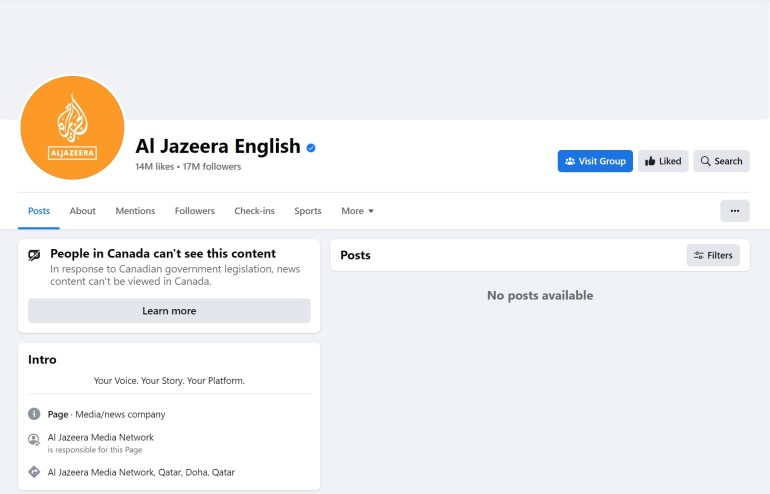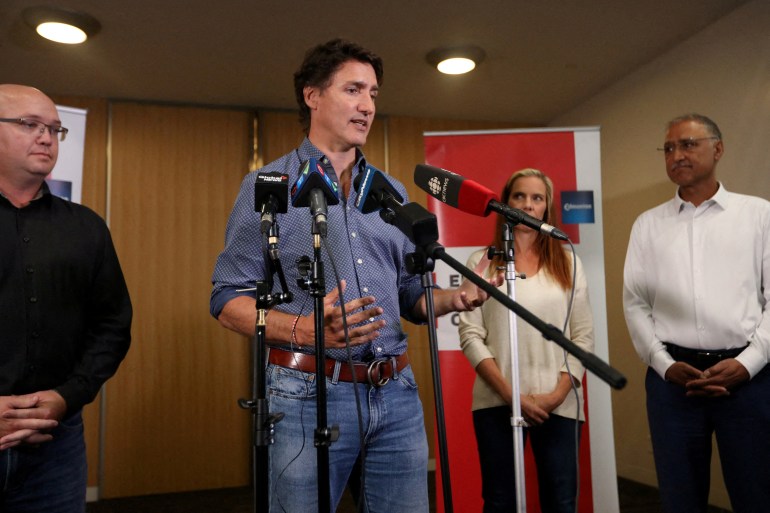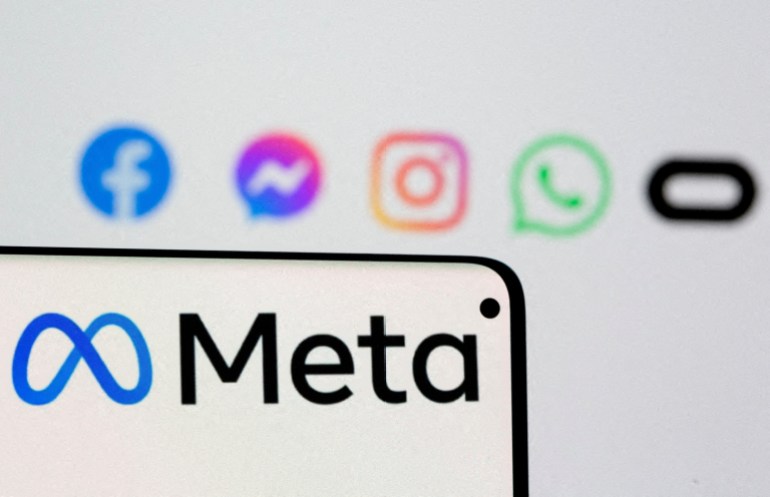As fires raged in Canada’s vast Northwest Territories earlier this month, officials rushed to evacuate tens of thousands of people before the flames could reach the capital of Yellowknife.
A citywide evacuation deadline loomed and ensuring residents had access to accurate information regarding emergency flights, road closures and temporary shelters was literally a matter of life and death.
Yet despite pleas from politicians and journalists, Meta – the owner of popular social media sites Facebook and Instagram – refused to lift its block on news in Canada, raising alarm and anger across the nation of more than 40 million people.
“The ban is still a stupid and dangerous thing,” Ollie Williams, editor of the Yellowknife-based Cabin Radio, told Al Jazeera.
Williams said that although people were able to reach the news outlet’s content and find ways around the ban, including by posting screenshots of articles, during the peak of the wildfires, Meta’s policy remains unjustifiable.
“It shouldn’t be in place – certainly not right now,” he said.
The law
In June, the Canadian Parliament passed the Online News Act, requiring social media companies to share revenue with media outlets that share their content on the platforms.
The government said the law, which does not go into effect until the end of the year, was part of a push to help the struggling Canadian media industry. It calls for voluntary commercial agreements between large digital platforms – such as Facebook and Google – and news outlets, but allows Ottawa to step in if such deals are not reached.
Digital platforms responded forcefully to the legislation, with Google calling it a “link tax” and threatening to stop featuring Canadian news websites in its search and other platforms when the law comes into force.
Meta went a step further: It imposed a Canadian news blackout beginning on August 1, effectively blocking Facebook and Instagram users in Canada from being able to see news articles on the platforms or to post links themselves.
“The legislation is based on the incorrect premise that Meta benefits unfairly from news content shared on our platforms, when the reverse is true,” the company said in a statement in June.
The Canadian government slammed Meta’s position and Prime Minister Justin Trudeau more recently decried the decision to maintain the block during the Yellowknife evacuations as “inconceivable”.

“Facebook is putting corporate profits ahead of people’s safety,” Trudeau said last week.
But the company has refused to back down in a standoff that raises challenging questions about whether social media platforms have responsibilities to society, what role governments have in regulating them, and what the future is for journalism in the digital age.
Experts told Al Jazeera that the impasse should push news outlets to rethink their reliance on social media to reach audiences and propel policymakers to find ways to support local journalism.
“There is much danger in becoming too dependent upon these large platforms as core parts of your business model and your operations; it makes you structurally vulnerable,” said Dwayne Winseck, a professor of media studies at Carleton University in Ottawa.
Supporters of the law also say it aims to correct a skewed relationship between news outlets and social media websites, where journalists do the hard work but large platforms get the lion’s share of digital advertising.
The Canadian government has reported that more than 450 news outlets have closed across the country over the past 15 years while at least one-third of journalism jobs have disappeared since 2010.
“As Meta and Google were consolidating their grip on online advertising and the online distribution and sharing of news, journalists and journalism were undergoing a crisis,” Winseck told Al Jazeera.

Meta responds
In response to complaints during the recent Canadian wildfires, Meta has touted Facebook’s “Safety Check”, which allows people to mark themselves as “safe” during emergencies through a so-called “crisis response” page and request support if needed.
A company spokesperson told Al Jazeera in an email this month that the Safety Check system also allows Facebook users to “access updates from reputable sources” in times of crisis.
“People in Canada can continue to use our technologies to connect with their communities and access reputable information, including content from official government agencies, emergency services and non-governmental organizations,” the spokesperson said.
But Facebook’s crisis response page for the Northwest Territories wildfires contains mostly video content, including from obscure and non-Canadian news outlets.
And critics have said the wildfires in Yellowknife and other parts of Canada highlighted Meta’s uncompromising stance. Brent Jolly, president of the Canadian Association of Journalists (CAJ), said Meta’s “entrenchment” reflects badly on the company.
“It certainly – for me – speaks volumes about their commitment to disseminating quality information [and] serving their users,” Jolly told Al Jazeera.
For his part, Williams at Cabin Radio said he tried to reach out to Meta for a private conversation, but he has not received a response.
He said he does not necessarily support the new law, noting that it was mostly backed by large media organisations without consultation with smaller outlets. “But I also think it’s pretty unconscionable to keep the ban in place when it wouldn’t affect them to temporarily lift it,” Williams said.
‘Caught in the web’
It’s difficult to fully assess how Meta’s decision affected the wildfire evacuation effort.
But Winseck said the news blackout disrupts “the chain of information flow” within a community because people are cut off from those within their social circles whom they trust to post credible news and information.
Emilia King, an assistant professor in communication and digital media studies at Ontario Tech University, cautioned that the ban could also lead to a resurgence of online misinformation – a problem Canada and many other countries are already grappling with.
“The Canadian citizens, they’re suffering; they’ve been caught up in the web of this big conflict,” King told Al Jazeera.
“We’ve become accustomed to these platforms almost as if they’re public utilities. But clearly, they’re not. They’re private companies. They’ve proven time and time again that they put their own interests first,” she said.
Several experts said Meta is drawing a line to ensure that other countries do not follow suit and try to regulate the platform. “It’s like serving garlic to a vampire,” King said of social media companies’ aversion to government regulations.
There is a precedent to the situation in Canada.
In 2021, Facebook blocked news content in Australia in response to a similar draft law. The ban lasted just days, however, as the government amended the proposal to give social media platforms more time to strike commercial deals with media outlets before intervening.
The legislation eventually passed. In December 2022, the Australian government hailed it as a “success”, saying that media outlets signed more than 30 deals to compensate them for news featured on Google and Facebook.

The Australian law ultimately enabled the government to apply the code where it saw fit. That, in turn, gave social media platforms a chance to show that they are contributing to the “sustainability of the Australian news industry” and be spared mandatory arbitration.
But the applicability of Canada’s law is broad, experts say, and it has already passed. Moreover, the Canadian Radio-television Telecommunications Commission (CRTC), which oversees media regulations, has not finalised the rules on how the legislation will be implemented.
Winseck said the Online News Act does not set clear criteria for who is covered by the regulations and who is not. “We should have very clear thresholds because without those clear thresholds, it looks like the legislation was specifically made to harpoon Google and Facebook,” he said.
Rethinking news
As the deadlock persists, Winseck said Canadian media outlets should rethink their approach and reliance on social media to reach audiences.
He called for “imaginative steps” to make up for the loss of reach from Meta and possibly Google in Canada, and suggested one of his own: An aggregate news service by CBC, the public broadcaster, that would feature content from outlets across Canada.
For his part, Jolly, the head of CAJ, said news outlets should remind their audiences of the importance of journalists’ work and invite them to consume the news directly from the source.
“It’s important for news organisations and independent journalists … to really emphasise that, ‘Hey, we’re the ones who are on the front lines,’” he said.
Sumber: www.aljazeera.com
 Skip to content
Skip to content

